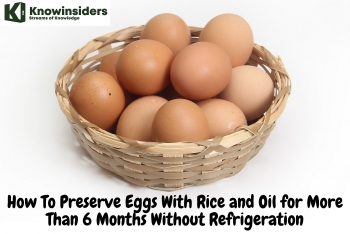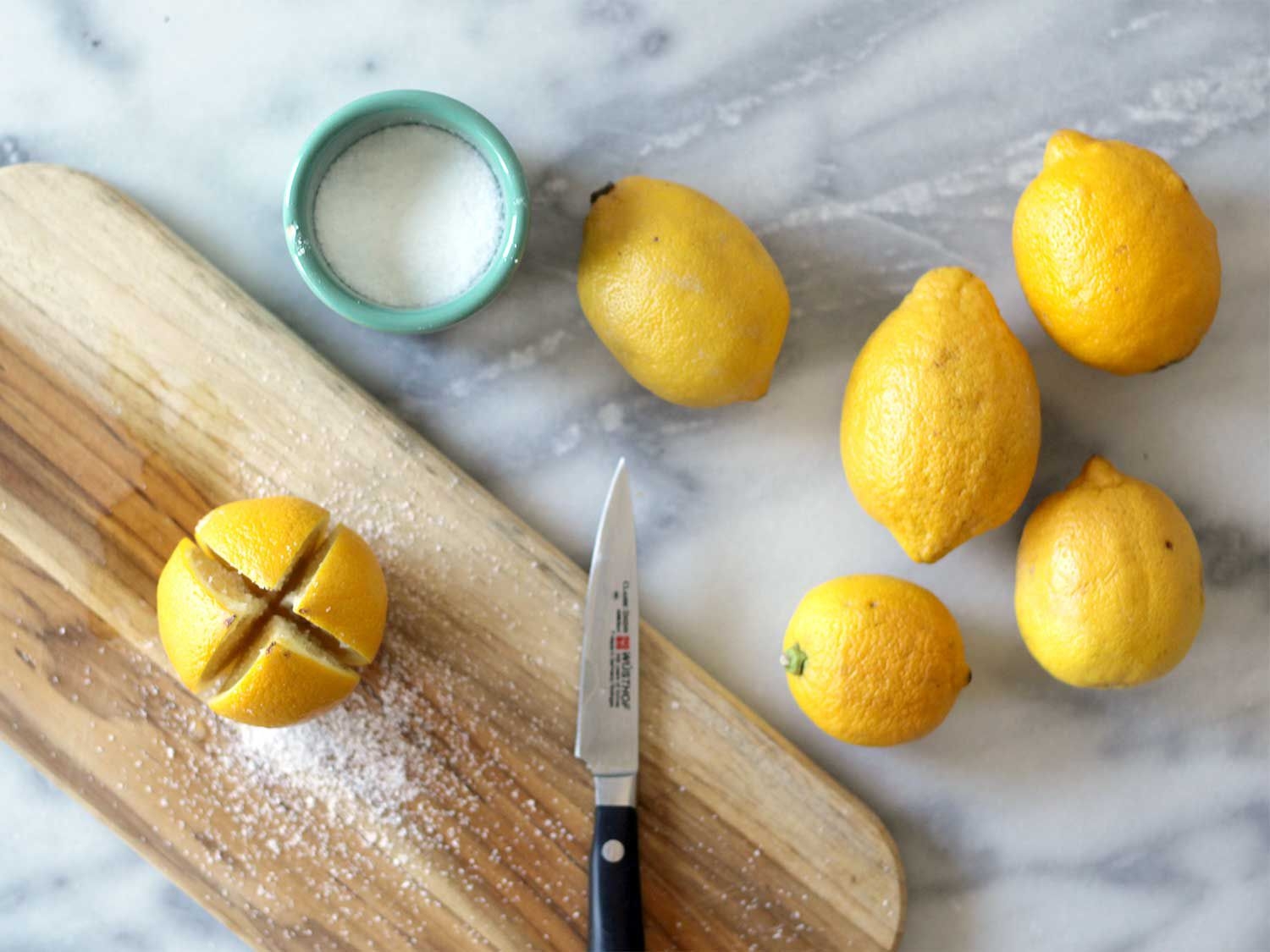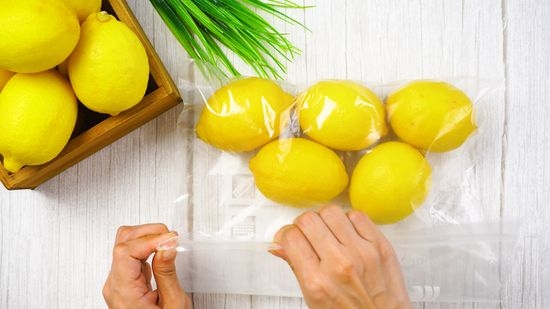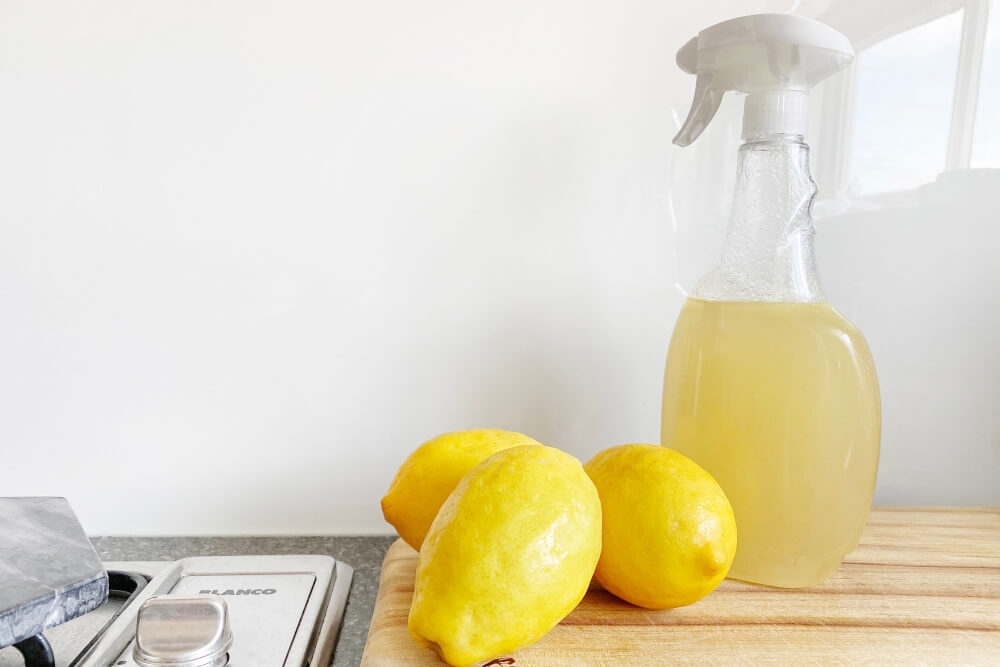How To Preserve Lemons Without Refrigeration For A Few Months
 |
| How To Preserve Lemons Without Refrigeration For a Few Months |
| Table of Content |
Lemons are great when you have them on hand and want to make lemonade, lemon recipes, or want to add color to your dishes. They also are a key ingredient in a lot of home remedies and homemade cleaning products as well.
They have many uses, that's why they're so amazing. Not having them when you need them can be upsetting but with the tips in this post, you can preserve them for much longer and have them whenever needed.
How long can lemons stay unrefrigerated?
If you ever bought lemons in bulk, you may have come across rotten lemons at one point in time. Rotten lemons become very soft and squishy, discolored, and form green mold by the rinds which eventually spreads to the whole lemon.
In the event you notice that there is mold or that the lemon is extremely squishy, there is no point in trying to salvage the lemon. Throw it out. The same goes for cut lemon.
The life of a lemon varies on how you store it. If you leave it out on your counter, at most, it'll last up to a week. If it's summertime or hot in your home, it'll last for a few days.
Lemons that are kept in cooler areas, away from heat, will last about two weeks. If you decide to store your lemons in the fridge, they can last a maximum of four to six weeks.
Cutting up lemons in the fridge will only last about a few days and a week if it is covered or in a container. Hot, humid areas are detrimental to the preservation of the lemon. Cooler if not cold areas will increase the life of a lemon.
What kind of lemons is good for preserving?
Since you'll be eating the entire fruit, we recommend buying organic Eureka lemons (regular lemons) that have not been sprayed or treated with chemicals. Select ones that are heavy for their size with thin fine-textured peel and dep yellow color. Meyer lemons are also a great option, since their thinner skins are not very bitter.
Best Tips for Storing Lemons
The following food storage tips can help keep lemons fresh:
♦ Choose the right lemons. Choose lemons that are bright yellow and not too mature. Younger lemons will last longer in storage.
♦ Store lemons by themselves. Store lemons away from other fruits. Fruits such as apples and bananas release ethylene gas as they ripen, which can speed up the natural ripening process of lemons.
♦ Make lemon water. If you have sliced lemons to use, make lemon water by combining the lemon slices and water and leaving it in the refrigerator.
♦ Zest frozen lemons. It is easier to zest a frozen whole lemon than a fresh lemon. To add a zesty kick to a recipe, take a frozen lemon from the fridge and run the rind over a lemon zester tool.
What Fruits Shouldn’t be Stored with Lemons?
Like onions and potatoes, there are some fruit combinations that shouldn’t be stored together. Don’t store apples, bananas, stone fruit or pears with other fruits—including lemons. Apples emit a gas as they age that can cause other fruit to ripen (and then spoil) more quickly.
An easy solution is just to store apples in one crisper drawer and the rest in another.
Now that you know the best way to keep lemons, it’s time to stock up on a few extras. I’ll be using mine to make these lemon-basil recipes followed by this five-star poundcake.
 How To Preserve Eggs With Rice and Cooking Oil for 6 Months Without Refrigeration How To Preserve Eggs With Rice and Cooking Oil for 6 Months Without Refrigeration Preserve eggs easily with one of these safe and effective ways in this article to make them last months and even years longer! |
How To Preserve Lemons Without Refrigeration
1. Salt Preserving
 |
| Photo: seriouseats |
This is one of the easiest ways to store lemons over the medium term, but this method requires some time to cure before eating. All you need to do is butterfly the lemons into quarters by cutting them from top to bottom, but make sure to leave the bottom intact so the pieces remain connected. Next, place them in a large bowl and coat the openings with a very generous layer of salt. Toss the lemons in the bowl and add more salt as necessary to ensure that they are all evenly coated. Cover the bowl with some foil or plastic wrap and put it in the refrigerator for 12 hours.
You will notice that there is a lot of water in the bowl when you pull it out of the refrigerator as the salt draws out the liquid. Transfer the liquid, salt as well as lemons into a mason jar with a clasped airtight lid. Press down on the lemons firmly until they are completely submerged under the liquid and clamp down the lid. Store the jar in a cool, dark place for at least a month to allow the lemons to ferment and cure. Keep in mind, that the longer you cure the lemons, the more potent, concentrated, and flavorful the juices will be, and the options are limitless as to what you can do with them.
2. Preserve lemons with sand
First, you have to choose lemons that are still intact, not crushed. Prepare some moist sand. If the sand is too dry, you can add more water. Note, only water a little water to keep the sand moist, not drenched because too much water will cause the lemon to swell.
Get a crock pot, if you don't have one, you can use a plastic bucket.
Spread a layer of sand on the bottom and then put a layer of lemon on top. Continue to cover with sand and arrange lemons in the jar until all are gone. Cover all the lemons with sand.
Place the lemon jar in a cool place, out of direct sunlight. When needed, just take the lemon out of the jar and wash it. The remaining lemon must be covered under the sand.
This method can be applied to other fruits such as oranges, tangerines, grapefruits...
3. Store lemons in zip bags
 |
| Photo: wikihow |
Buy lemons, wash and drain. Put the lemons in a ziplock bag or plastic container, cover, and place them in the refrigerator. This way will help keep the lemon fresh, not directly affected by the cold air in the refrigerator, and not lose water.
4. Preserve lemons with newspaper
You can use unused newspaper to seal the lemon. Place the lemons wrapped in newspaper in the freezer tray in the refrigerator. The newspaper will reduce the exposure of cold air in the refrigerator to help lemons not wither, keeping the essential oil.
5. Freezer Lemons
An easy way to preserve whole lemons, lemon slices, lemon juice, and lemon zest is to simply pop them in the freezer.
Although frozen lemons retain their mouth-puckering taste, when thawed out they can become a bit mushy. Toss them into your chosen recipe when they are still somewhat frozen and they will be much easier to work with.
Whole Lemons
Freezing lemons whole is a snap. Just thoroughly wash and dry the lemons before putting them in the freezer.
When ready to use, whole lemons can be grated with a cheese grater. Use an oven mitt to protect your hand from the icy cold lemon as you grate away.
Once the entire lemon is in small bits, transfer these to a glass jar or plastic bag and place it back in the freezer. Use it by the spoonful to flavor dishes and drinks.
6. Lemon Vinegar
 |
| Photo: Clear View |
Lemon vinegar is a simple yet powerful all-purpose household cleaner.
This non-toxic, all-natural cleanser provides a deep cleaning to many surfaces around the home – including windows, mirrors, floors, countertops, kitchen appliances, bathroom surfaces, and more. This formula is highly acidic so avoid using it on marble and granite.
It’s easy to make too. Using a large jar with a lid, add as many lemon peels as will fit inside and cover with distilled white vinegar. Screw on the lid and let it infuse.
After two weeks, strain out the lemon peels. Fill a spray bottle halfway with lemon vinegar and the rest with plain water.
7. Lemon Wine
Making wine from lemons is a delicious way to use up an overabundance of fruit while supplying yourself with a heady brew.
Lemon wine is light, citrusy, and refreshing. It pairs very nicely with fish and pasta dishes.
Made up by the gallon, this recipe calls for 10 lemons, a gallon of filtered water, 1 teaspoon of wine yeast, 5 cups of sugar, and a half cup of chopped raisins. The raisins are an important ingredient since they provide tannins and add body to the finished wine.
Once the lemon wine is bottled, allow it to age for at least 3 months before imbibing.
How To Store Lemon Zest
Do you have a shiny bright lemon?
Does it smell wonderful? Well, you should not lose that fragrance.
So, go ahead and zest it before you throw it. Don’t throw the lemon peels without zesting them even if you do not need them right away. They are great for cakes and tarts.
Zest is a great addition to your veggie dishes. When you zest your lemon, it can stay fresh for up to a week in the refrigerator.
If you want to keep them for longer, put them in a zip lock and toss them in the freezer. You never know when you might need them!
How To Store Lemon Juice
If the lemons do not look so well, why not squeeze them? Go ahead ad squeeze the lemons.
Put the juice in the fridge. They stay fresh for two days. After that, it is better to use them for baking or cooking.
If you d not use them, you can put them in the ice cube trays. Once hardened, put them in a zip lock or an airtight container in the fridge to use them when needed.
Simple Tips to Preserve Half-Cut LemonsTo preserve the cut lemons, simply add a few drops of vinegar to a small dish. Place the sliced lemon face down on a plate. This way, the lemon will not dry out your face and lose water. If you don't need to use a lot of lemon juice but only take a few drops, you can poke a few small holes in the lemon peel, and squeeze gently to get a few drops of lemon juice. Then, wrap the lemon with cling film and store it in the refrigerator. This will prevent the lemon from wilting. |
 How To Get The Viral Sad Face or Crying Filter on TikTok? How To Get The Viral Sad Face or Crying Filter on TikTok? The Sad Face or Crying Filter is recently trending on TikTok and has gone viral insanely. Find out what it is, and how you can ... |
 Ways to Make Cooking Oil As Car Fuel: Step By Step Ways to Make Cooking Oil As Car Fuel: Step By Step It is possible to run a vehicle on cooking oil. If you plan to make the switch, consider these ways to make cooking oil and ... |
 How To Preserve Eggs With Rice and Cooking Oil for 6 Months Without Refrigeration How To Preserve Eggs With Rice and Cooking Oil for 6 Months Without Refrigeration Preserve eggs easily with one of these safe and effective ways in this article to make them last months and even years longer! |























